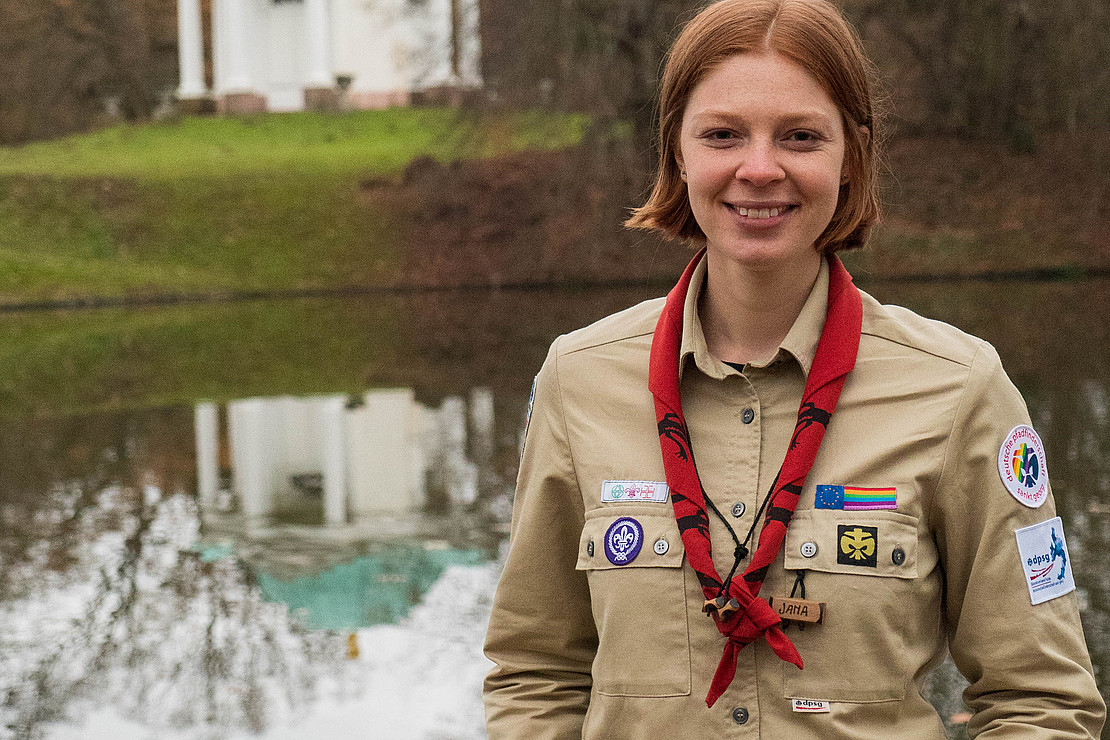This page contains automatically translated content.
"We create memories" - Interview with Jana Wendelken
 Image: Marvin Raußen.
Image: Marvin Raußen.Ms. Wendelken, you were selected as a finalist in the Engagement Award category - what does that mean to you?
I'm absolutely delighted and didn't really expect it. My voluntary work is not a temporary project, but one that runs continuously. After a recommendation from the Studienstiftung, I thought to myself: I'll just give it a try. I think it's really nice that my work and the area I'm involved in is being honored. The award also gives me the opportunity to exchange ideas with the other award winners - that's very exciting.
How long have you been with the DPSG and why did you decide to get involved?
I joined about thirteen years ago, when I was 13, as a teenager. That's actually relatively late for scouting. After three years as a scout, I started leading groups myself when I was about 16 and now I've been leading a permanent group in Witzenhausen since 2019. Looking back, I realize how much the leaders gave me back then as a scout.
What motivates you in your voluntary work, what do you particularly enjoy about it?
A big motivation in my tribal work[a "tribe" in Scouting is a local group, editor's note] is that the members of the association share many common values: We are close to nature, sociable and environmentally sensitive, and value regional, fair food. It also really motivates me to see how we create memories for children and young people. We can make a positive impression on young people and share wonderful experiences with them.
What I particularly appreciate about committee work is the opportunity to think outside the box and see how others work. But I also have a great team. However, my involvement at both levels means I always have to plan my weekends and free time well in advance, which unfortunately leaves little room for spontaneity. In the end, however, the work gives me more energy than it draws.
You already mentioned committee work yourself: you have also been Chair of the DPSG Fulda diocesan association since 2022. What motivated you to do this and what does this work involve?
Yes, when the position on the diocesan board was vacant two years ago, my current co-chair asked me if I would be interested in the position. I thought about it, stood as a candidate and was elected. You are always elected for three years, and there is still one left.
I actually receive the commitment award for my voluntary work as diocesan chairwoman, i.e. for my committee work - but in reality, the two areas of my voluntary work are closely linked. As chairperson, I represent the association internally and externally and organize a wide variety of events, including for the children and young people in our tribes. I appreciate the variety of committee and youth work and have the feeling that I can really make a difference.
Do you have specific goals as a board member?
Both my tribe in Witzenhausen and my diocesan association have been recognized as a "fair trade tribe" and "fair trade diocesan association", which I am very proud of. I would like to support more tribes on their way to becoming Fair Trade tribes. It is also very important to me to promote the training of leaders.
One goal that I have already achieved was to organize a diocesan camp. This is a joint camp for all 17 tribes that exist in the Fulda diocesan association, instead of just one, as many may know it. We would also like to host the DPSG national assembly here in Fulda in 2024.
You are also studying organic farming in Witzenhausen. Is there any interaction between your studies and your voluntary work?
Definitely. On the one hand, I can pass on a lot of knowledge from my studies, for example by talking to the children in my group about agriculture and food production. And as diocesan chairwoman, I have the opportunity to make the topics of nutrition and food more present through committee work. And of course, I also learn a lot in my voluntary work that benefits me personally and for my studies - for example, organization, moderation or how to give good interpersonal feedback. I definitely also had to learn to communicate my limits in order to somehow manage everything.
What advice would you give to others - students and anyone else - when it comes to volunteering?
I would say that volunteering is worthwhile. It's worthwhile for yourself and is also important and good for society. Networking and exchanging ideas with others is very valuable - both for finding a suitable volunteer position and within the volunteering sector, because you can also make great contacts for the future. It's also helpful to try out different things and explore your own interests so that you can find something that you really like and enjoy. Volunteering teaches you to take responsibility, for yourself and for others, and to stand up for yourself - in my case, it's great that I can also teach the children the same thing.
One last question: the prize is also endowed with €1,000. Do you have plans for what you want to do with the prize money?
That's a good question, but I don't actually have any concrete plans yet. I might want to put some of it directly into my project or use it to get a sailing license. That would also be very useful for camps with the children and young people in the future.
The interview was conducted by Lisa-Maxine Klein.